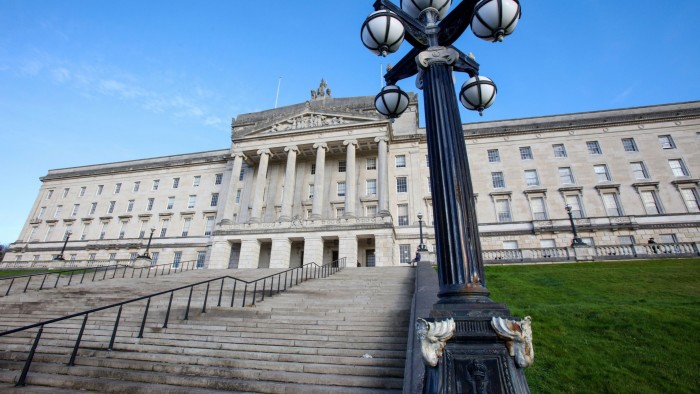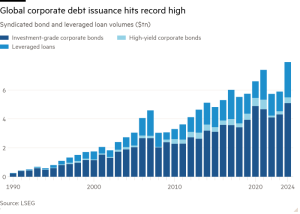Northern Ireland braced for more Brexit turbulence

This article is an on-site version of our Inside Politics newsletter. Subscribers can sign up here to get the newsletter delivered every weekday. If you’re not a subscriber, you can still receive the newsletter free for 30 days
Good morning. Whatever and wherever you celebrate, I hope everyone is enjoying some lovely holiday time. It’s my turn to stand in for Stephen today, with some reflections about Northern Ireland’s year ahead.
The year began with the return of the power-sharing executive when the Stormont Assembly was reinstated in February (eased by a £3.3bn handout from the UK government) after a two-year Brexit impasse. A lot has changed since — including new leaders for three of the five main parties, a historic funding allocation in the October UK Budget and the Stormont executive’s gritted-teeth, needs-must determination to live within its means . . . finally.
But much has stayed the same: the executive still has no real plan to fix the UK’s worst health service waiting lists and too little money to meet all of the region’s howling infrastructure needs. Caoimhe Archibald has impressed as finance minister but all departments have less cash than they want and the executive, pleading poverty, has skirted tough decisions.
What will 2025 bring? In short, Brexit back in focus and possibly more political turbulence.
Inside Politics is edited today by Georgina Quach and Harvey Nriapia. Read the previous edition of the newsletter here. Please send gossip, thoughts and feedback to [email protected]
No Brexit break
Two things happened in December: Stormont (as expected) voted to keep in place for another four years key parts of the Windsor framework governing post-Brexit trade for Northern Ireland. (Remember, Brexit left Northern Ireland with access to the EU’s single market for goods, and thus some EU laws still apply).
But the following week, pro-UK unionist legislators pulled the so-called “Stormont Brake”, for the first time activating a mechanism that allows the assembly to lodge objections to the automatic application of updated EU legislation.
The row in question is about fonts and spacing on labels for chemical products, which sounds petty and far from “significant impact specific to everyday life of communities in Northern Ireland in a way that is liable to persist” — the test for the UK government upholding any objection. But unionist leaders say the EU law update is significant and could play havoc with the £1bn trade in chemical products between Britain and Northern Ireland, and pile costs on to manufacturers if they have to change their labels.
The Stormont Brake process is involved and lengthy (catch up here) and the ball is now in the UK government’s court. The logical thing would be for the UK to harmonise its labelling requirements with the EU rules, but whether it will is not clear.
What is apparent, though, is that unionists are vexed. Steve Aiken, finance spokesperson for the small Ulster Unionist Party, complained that the EU was able to waive its Brexit rules on checks on goods entering the region — but only when it wanted to. On the same day the Brake was triggered, the EU eased checks on goods arriving from Britain to relieve pressures in the wake of storm damage to Holyhead port in North Wales.
Aiken stopped short of suggesting unionists could pull down Stormont again over such Brexit concerns, but warned darkly of potential “unintended consequences”. Gavin Robinson, leader of the largest pro-UK party, the Democratic Unionist Party, also said it would be wrong to minimise the impact of the EU law change, saying: “Those who ignore such warnings do so at their peril.”
More Brexit regulations are also arriving, including the EU’s General Product Safety Regulations for businesses selling into Northern Ireland, which came into effect in December, and new arrangements for parcels which are due to be introduced in March. It remains to be resolved how health and safety rules for agrifood, as well as the EU’s Carbon Border Adjustment Mechanism — a tax on carbon-intensive imports to stop polluting nations from undercutting member states — will be applied.
All this comes against the backdrop of the UK’s desire for closer ties with the EU. “The UK government is effectively saying we need quiet around the Windsor framework so we can get a better, wider EU-UK relationship,” says David Phinnemore, a professor of European politics at Queen’s University in Belfast.
“If we have the ambition and if we secure something on SPS [sanitary and phytosanitary rules] [that] actually is the route to resolving some of the difficulties people have with the Windsor framework in terms of the movement of goods,” he adds.
Investment
Remember when Rishi Sunak, nearly two years ago, hailed Northern Ireland as the “world’s most exciting economic zone” because the Windsor framework gave it access to both the EU and UK? Surely investment — notably from the US — was going to cascade in, right?
But the head of Northern Ireland’s investment promotion agency admitted in October that there is no evidence of any yet. This month, Joe Kennedy III ended his stint as US special envoy with no major announcements under his belt.
Colin McCullagh, chief revenue officer at trade consultancy OCO says all is not lost, however. If incoming US president Donald Trump ends up treating the UK and EU differently in terms of trade, “companies might want to consider Northern Ireland for launching into the US,” he says.
He also has a New Year’s resolution for the region: think big. “There is the opportunity and great potential. We can produce great companies and attract FDI — we just need to do it on a more ambitious scale,” he says. “The ingredients are there. It’s time to start baking.”
Now try this
Speaking of baking, by the time you read this, I hope to have made one of these and to be curling up on a sofa with a slice of it and a good book (I’m currently reading this, a present from my son).
If you are looking for a wonderfully absorbing and thought-provoking read with an Irish angle, let me recommend Charlotte, by Martina Devlin.
Driving to Northern Ireland, I often saw the signs to the “Brontë Homeland” but had no idea how a literary family so cherished as English treasures could have connections here. Devlin explores Charlotte Brontë’s honeymoon visit to Ireland and how the country influenced her, and also reflects on the making of her myth through the eyes of the Irish woman that her husband (also Irish) goes on to marry after her death. Charming and compelling in equal measure. Pass the panettone . . .
Top stories today
-
He said, she said | Nigel Farage and Kemi Badenoch have accused each other’s party of faking their membership numbers, after Reform claimed it had more members than the Conservatives for the first time yesterday.
-
Construction obstruction | London is heading into the worst downturn in affordable housing supply in decades, as inflation, high interest rates and building safety costs hammer the finances of housing associations. New affordable housing dropped 88 per cent in the year to March.
-
Farm fibs | Tax lawyers have called the government’s claim that a “typical family” farm will receive a £3mn exemption from inheritance tax “misleading”, suggesting that such an exemption requires farmers to meet complex conditions, including potentially splitting up a farm’s ownership when one spouse dies.
Recommended newsletters for you
White House Watch — Your essential guide to what the 2024 election means for Washington and the world. Sign up here
FT Opinion — Insights and judgments from top commentators. Sign up here
#Northern #Ireland #braced #Brexit #turbulence






